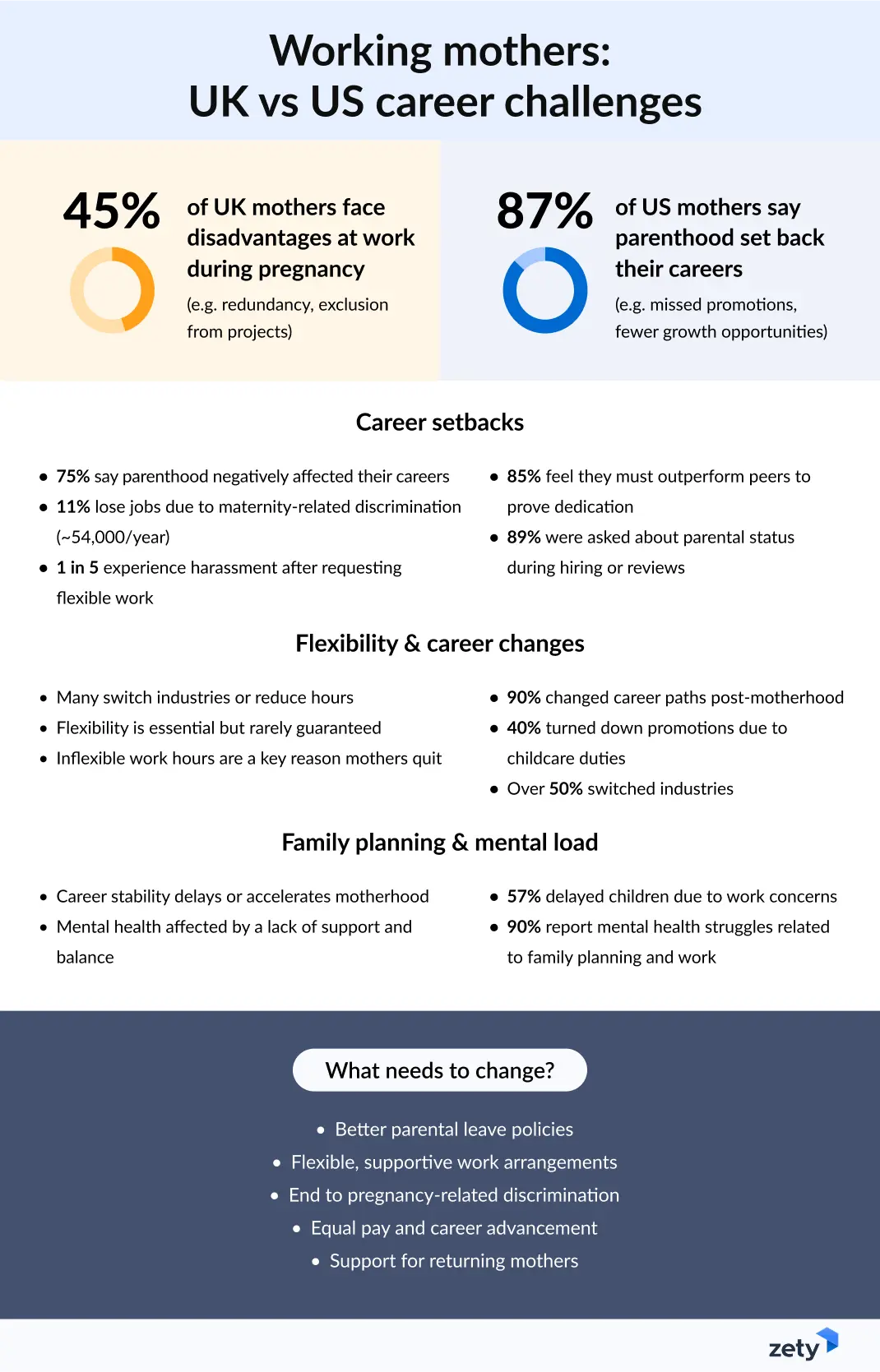75% of UK Mothers Face Career Setbacks
Create your CV nowWorking mothers worldwide, including those in the UK, continue to face serious professional challenges. Research from Zety, backed by UK government data and independent reports, paints a clear picture: balancing a career and parenting often comes at a steep cost.
For many women, balancing parenthood and professional ambitions is challenging, as motherhood often interferes with career development. In this article, I’ll take a closer look at the key challenges mothers face in work environments, such as discrimination and limited flexibility. I’ll also highlight how Zety’s US findings align with the experiences of mothers in the UK.
Key findings:
- 87% of working mothers globally feel that parenthood has set back their careers.
- 90% of them have altered their career path due to parenthood, with over half switching industries.
- 89% of mothers have been asked about their parental status during job interviews or performance reviews.
- 75% of UK working mothers say that parenthood has impacted their careers.
Career penalties for working mothers
Zety’s report, surveying nearly 900 working mothers across the US, reveals that motherhood often takes a toll on their careers. 87% of surveyed women reported that becoming a mother negatively impacted their job, resulting in missed promotions or other growth opportunities. In addition, 85% of working mothers feel that they must work harder than those without children to prove their commitment.
This mirrors the career struggles faced by mothers in the UK, where many of them realise that starting a family can impact their professional growth, limit opportunities, and expose them to discrimination. Mothers in the UK speak about being overlooked for promotions, experiencing slower career growth, or feeling left behind after returning from maternity leave.
Career changes and flexibility
Parenthood often forces women to reimagine their professional lives. In Zety’s study, 9 in 10 mothers said flexibility became their top priority, even if it meant changing careers, rejecting promotions, or stepping away from full-time work.
- 40% of working mothers have turned down a promotion due to childcare pressures.
- Fewer than 1 in 5 new mothers return to full-time work after maternity leave.
- 90% of mothers mention flexibility as their top workplace priority.
In the UK, many mothers face similar trade-offs. They typically seek flexible arrangements or entirely new roles to balance their work and family life, but it’s not always easy to achieve. Whether it's moving to part-time work, shifting industries, or stepping back from leadership roles, the pursuit of flexibility often comes at the cost of career growth.

Family planning and work
Workplace realities influence personal decisions, like when or whether to have children. In the US, 57% of surveyed mothers said they delayed starting a family because of career pressures, and 32%had a child earlier than planned because of work-related concerns. Additionally, 90% of women admitted that family planning challenges affect their mental health and focus at work.
In the UK, similar patterns are clear. Research shows that women often wait to feel “established enough” in their careers before starting a family, while others may accelerate their family plans due to job insecurity or a lack of work flexibility. Such decisions can have long-term effects on their well-being and family life.
Pregnancy bias and return to work challenges
For many women, pregnancy marks a shift in how they’re perceived at work. 84% of mothers in the US felt their pregnancy was seen as an inconvenience at work, and 77% feared telling their boss or coworkers about expecting a child.
In the UK, discrimination often starts during pregnancy and carries through the return-to-work period. Some mothers report being excluded from projects, passed over for roles, or even losing their positions altogether.
Returning to work after maternity leave often results in ineffective support and inflexible working conditions in the UK. Although women have legal rights to request flexible working terms after 26 weeks of service, their inquiries are frequently rejected, forcing them to struggle with balancing work and family life.
The data highlights the scale of these challenges in the UK:
- 45% of pregnant women report facing workplace disadvantages, like redundancy or being excluded from main projects.
- 11% of mothers lose their jobs due to pregnancy or maternity-related discrimination, which amounts to around 54,000 mothers each year.
- 1 in 5 mothers encounter harassment or negative comments related to their pregnancy or flexible working arrangements.
While 86% of mothers decide to return to the same company after parental leave in the UK, the lack of flexible options is still a serious issue. Inflexible working hours are, in fact, one of the top reasons mothers eventually quit their jobs. Even with legal protections in place, pregnancy and maternity leave continue to hinder the career progress of many working mothers both in the US and UK.
What needs to change?
To create a truly supportive work environment for mothers, we need changes in policies, workplace culture, and equal access to opportunities. These adjustments are essential for working mothers to achieve a better balance between their professional and personal lives.
- Better parental leave: Improving and supporting parental leave ensures women aren’t held back for taking time off to care for their children.
- Fighting discrimination: Employers must prevent pregnancy and maternity-related discrimination to ensure everyone has fair opportunities.
- Flexible work options: Flexible hours, remote work, and part-time possibilities need to be more widely available to help mums balance work and family life.
- Fixing the pay gap: Equal pay should be the norm, ensuring mothers aren’t financially penalised for keeping up with work and family.
- Mentoring and support: Offering mentoring and clear career growth opportunities will help mums get back on track after maternity leave.
Methodology
The findings are based on Zety’s survey of 899 working mothers in the U.S., with children under the age of 18. Conducted in April 2025, the survey explored participants’ experiences of motherhood in the context of their professional lives. Respondents answered a mix of yes/no questions, agreement-scale items, and multiple-choice questions designed to capture the challenges and realities of working while raising children.
To broaden the perspective, these insights are supplemented with UK-based data from a range of authoritative sources, including research from the House of Commons Library, Working Families, and HReview. The combination of US survey results and UK data gives a more comprehensive picture of the global challenges faced by working mothers, especially in Western economies.
Sources
- Cox J., (2023) Employers Are Failing Working Mothers, U.K. Research Shows. Forbes
- Francis-Devide B., Zaidi K., Murray A. (2025) Women and the UK economy, House of Commons Library
- Harvey M., (2023) Working Familiex Index 2023. Spotlight on lower-income families. Working families
- (2023) Women in Work 2023. PWC
- Cave D., (2023) One in five working mothers considering leaving work, new report finds. People Management
- Pacelli A., (2025) UK workplaces are failing working mothers, research finds. HRreview
- (2024) The Impact of Motherhood on Women’s Career Progression: A Scoping Review of Evidence-Based Interventions. PubMed Central
- Brand A., (2023) 250,000 mothers may leave their jobs. HRreview



